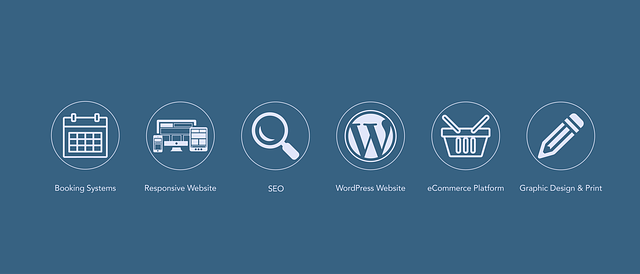SEO Services are crucial for small businesses aiming to flourish online by enhancing visibility and driving sales growth. By understanding search engine workings, businesses can employ strategies like keyword research, on-page optimization, and high-quality backlink building to attract target audiences. Effective SEO Services ensure small businesses stay competitive, visible, and agile in the digital landscape through strategic content optimization, mobile optimization, and leveraging AI/machine learning trends for personalized search results. Measuring success with analytics tools is vital for data-driven decision-making and maximizing ROI on SEO investments.
Small businesses looking to thrive in today’s digital landscape must master the art of search engine optimization (SEO). This essential strategy unlocks online visibility, attracts targeted customers, and fosters sustainable growth. Understanding the fundamentals of SEO and implementing effective strategies can level the playing field for small businesses, enabling them to compete with larger rivals. From optimizing website content to leveraging budget-friendly techniques, this article guides you through the process, emphasizing the critical role of SEO services in achieving long-term success.
Understanding SEO for Small Businesses: The Basics

Search Engine Optimization (SEO) is a powerful tool for small businesses aiming to thrive online. At its core, SEO involves understanding how search engines work and optimizing your website to rank higher in relevant searches. This strategy ensures that potential customers find your business easily when searching for products or services related to what you offer. By implementing effective SEO practices, small businesses can increase their visibility, attract more organic traffic, and ultimately boost sales.
The basics of SEO include keyword research, on-page optimization, and building high-quality backlinks. Keyword research involves identifying the terms potential customers use when searching for your products or services. These keywords are then strategically placed throughout your website’s content, titles, meta descriptions, and headings to signal to search engines what your page is about. On-page optimization ensures that your website is user-friendly, providing a seamless experience with fast loading times, mobile responsiveness, and engaging, informative content. Building backlinks from reputable sources helps establish your business as an authority in your industry, improving your website’s credibility and search rankings.
Why SEO Services Are Crucial for Small Business Growth

In today’s digital era, online visibility is paramount for small businesses aiming to thrive in a competitive market. This is where SEO Services come into play as a powerful tool for growth and sustainability. By optimizing websites and content, local and regional businesses can attract their target audience more effectively, increasing their chances of converting visitors into loyal customers.
SEO Services offer numerous benefits tailored to the unique needs of small enterprises. They enhance search engine rankings, making it easier for potential clients to discover these businesses online. Furthermore, these services provide valuable insights into customer behavior and market trends, enabling small businesses to stay agile and competitive. Through strategic keyword research and on-page optimization, SEO ensures that local businesses are not just seen but also preferred by their target demographics.
Key Components of an Effective SEO Strategy

An effective SEO strategy for small businesses involves several key components that can significantly boost online visibility and drive targeted traffic. First, conducting thorough keyword research is paramount. Understanding what potential customers are searching for allows businesses to optimize their content, ensuring it aligns with relevant queries. This process includes identifying long-tail keywords, which can attract more specific, high-intent visitors. By incorporating these keywords naturally into website copy, meta tags, and headings, businesses can improve their search engine rankings over time.
Additionally, building a robust online presence requires a multifaceted approach. This involves optimizing the website for mobile users, ensuring fast loading speeds, and creating high-quality, engaging content that provides value to visitors. Implementing structured data markup can also enhance search results by adding rich snippets, enticing users with more informative previews. Leveraging social media platforms and encouraging customer reviews further strengthens a business’s online reputation, contributing to its overall SEO success and attracting potential clients seeking reliable local services.
Practical SEO Techniques for Small Businesses on a Budget

Small businesses often operate with tight budgets, but that doesn’t mean they can’t implement effective SEO (Search Engine Optimization) strategies to boost their online presence. The key lies in adopting practical and cost-efficient techniques that deliver tangible results. One of the most powerful tools at their disposal is keyword research. Identifying relevant keywords with high search volumes yet low competition allows businesses to optimize their content, ensuring their website ranks higher for targeted terms. This can be done through simple, yet effective, on-page optimization practices such as strategic use of keywords in titles, meta descriptions, and body copy.
Additionally, building a solid foundation of quality backlinks remains crucial for SEO success. Small businesses can achieve this by reaching out to industry influencers, local bloggers, or relevant online forums to secure backlinks from authoritative sources. Engaging with local communities through Google My Business listings and local business directories also signals search engines about the business’s locale, enhancing its visibility in local search results. Furthermore, leveraging social media platforms for content promotion not only drives traffic but also fosters engagement, which can positively impact SEO rankings over time.
Measuring and Analyzing SEO Success: Tools & Metrics

Measuring and analyzing SEO success is an essential part of any comprehensive SEO strategy, especially for small businesses looking to compete in a crowded market. The right tools and metrics can provide invaluable insights into the performance of your SEO services, helping you understand what’s working, what needs improvement, and how your efforts translate into tangible results. Key metrics include organic traffic growth, keyword rankings, click-through rates (CTRs), and bounce rates.
Utilizing SEO tools like Google Analytics, Search Console, SEMrush, or Ahrefs allows businesses to track these metrics over time. Organic traffic growth indicates the overall health of your SEO efforts, while keyword rankings reveal how well your website is performing for specific search terms. CTRs measure the effectiveness of your content in attracting clicks, while bounce rates help identify pages that may need improvement to keep visitors engaged. Regularly reviewing and analyzing these data points enable businesses to make informed decisions, adjust their strategies, and maximize the return on investment in SEO services.
Future Trends in SEO for Small Business Success

With the ever-evolving digital landscape, staying ahead in search engine optimization (SEO) is crucial for small businesses to thrive. Future trends in SEO will continue to emphasize user experience and mobile optimization, as more people access the internet through their smartphones. This shift requires small businesses to ensure their websites are mobile-friendly, fast, and easy to navigate.
Additionally, artificial intelligence (AI) and machine learning will play a significant role in personalizing search results. Small businesses should focus on creating high-quality, relevant content that incorporates long-tail keywords and natural language processing techniques. By staying current with these trends, small businesses can leverage SEO services to improve their online visibility, attract more organic traffic, and ultimately boost their bottom line.
